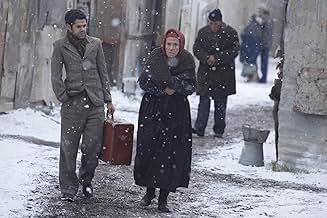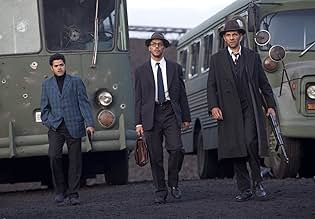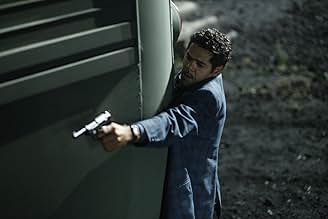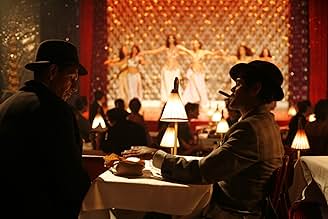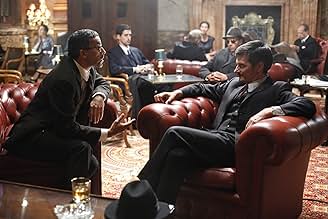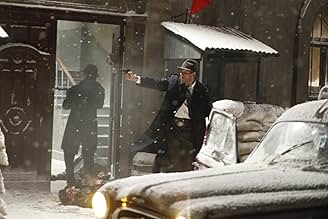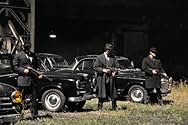Un drama sobre la lucha argelina por la independencia de Francia después de la II Guerra Mundial.Un drama sobre la lucha argelina por la independencia de Francia después de la II Guerra Mundial.Un drama sobre la lucha argelina por la independencia de Francia después de la II Guerra Mundial.
- Dirección
- Guionistas
- Elenco
- Nominado a 1 premio Óscar
- 2 premios ganados y 5 nominaciones en total
- Le père
- (as Ahmed Benaissa)
- L'entraîneur
- (as Mohamed Djouhri)
- Dirección
- Guionistas
- Todo el elenco y el equipo
- Producción, taquilla y más en IMDbPro
Opiniones destacadas
I loved it because it really shows how people can get sucked into resistance, even if they're very ordinary and not particularly brave, because the other option of not doing anything is so awful. I thought the acting was very convincing and I learnt a lot about that time in Algeria. I spend a lot of time in the south of France so I think this helped me to understand the history of some of the people I know.
Goodness me this site wants me to write 10 lines. No wonder everyone else's reviews are so long. I watched it a long time ago when it first came out and so I don't have a clear memory of details, just the overall impression, and I wanted to share that.
Much seems to have been made about the liberties that this film has taken with the facts surrounding certain key historical events. I am not in any position to say if this is a justified complaint or not, as I simply do not know. However, I think it's only fair to say that the plot-line follows a historically accurate path; whether or not the emphasis of events is skewered or not I can't say but, if so, it would not be the first time in cinema history that a film exaggerates for dramatic effect. Whatever the case, it's certainly a period in history that hasn't been depicted in films very often from what I can gather.
While I did enjoy the film, I didn't think it was nearly as good as Rachid Bouchareb's earlier film Days of Glory. That latter film dealt with a similar theme - the difficulties French Algerians have experienced in their adopted land. I felt that Outside the Law didn't share that movie's sympathetic characters or its dynamic plot trajectory. It's overall a much more down-beat story.
The film opens in 1925 when a family in Algeria faces the French representative who informs a family that the government is taking their ancestral land and home: Le père (Ahmed Benaissa), La mère (Chafia Boudraa) and their three sons Saïd, Messaoud and Abdelkader. Understandably devastated they pack their scant belongings and leave. Jump to 1945 and the massacre of Setif, an event that forces the family to disperse: La mère with Saïd (Jamel Debbouze) move to a shantytown for Algerian refugees outside Paris and Saïd becomes involved with organized crime in Pigalle to support his mother (he begins as a pimp, then as a Cabaret owner, and moves into more dangerous activities such as fixed boxing matches, etc). Messaoud (Roschdy Zem) has become a soldier with the French army in the fruitless war in Indochina (Vietnam) and observes as the French retreat that external colonization of a country will always fail because of the inherent patriotism of the indigent people. Abdelkader (Sami Bouajila), because of this participation in the resistance during the Setif Massacre, has been imprisoned in France where he gains insight from his fellow Algerians that they must revolt and fight to regain independence for Algeria. Once reunited Abdelkadan becomes the driving force behind the Algerian's FLN movement. He is the local figurehead and brains, while his brother Messaoud acts as the muscle and bodyguard. Brother Said continues his pursuit of money through shady night clubs and as a boxing promoter, but he is never far from his brothers' sides - even if he isn't quite as politically motivated. The film jumps to the 1950s and the early 1960s following the development of the Algerian resistance as it becomes a murderous group, assassinating the French officials and police, engaging in fierce gun battles, all the while under the malicious eye of their nemesis Colonel Faivre (Bernard Blancan). As deaths in the family occur the family dwindles but always with the promise to each other that Algeria will gain its independence, a fact the is revealed through historic film footage from 1962.
The film is a tense reenactment of battles and crime scenes, but there is a problem with the script in detailing the personalities of each of the characters beyond their devotion to Algerian independence. Even a marriage and the birth of a son and the death of the mother fail to substantially affect the three brothers beyond the expected reactions. The actors are all excellent but without the benefit of a script that allows them to offer us unique and meaningful individuals they become tropes. As a viewer remembering the brilliance of Days of Glory this film is strangely uninvolving. There is a sense that Rachid Bouchareb feared condemnation by either the Algerians or the French. Much can be said in favor of that stance: no one is 'right' or 'wrong' in war. But at movie's end we are left oddly outside the emotional aspect of the film that was the key to the success of Days of Glory. In the end this is a very well made and powerful film that answers many questions about the French Algerian conflict few of us understand.
Grady Harp
This film plays out like a historical gangster movie and considering it's length i really enjoyed it. There is loads of action and it is beautifully shot. There is some fantastic acting and really enjoy watching Jamel Debbouze who was great in Days of Glory.
It's not a surprise that i really likes this as I'm a big fan of foreign cinema and combined with a historical theme , i was always going to like it.
¿Sabías que…?
- TriviaAlgeria's official submission to the 2011's Oscar as Best Foreign Language Film.
- ErroresThe French air force plane in 1953 in Indochina seems to be a today's Hercule C130, instead of a Noratlas that was used then.
- Citas
Le caïd: I have a court order. This land has been given to the colonist Mr Guérini.
Le père: But Kaid, this land belongs to my father and my ancestors.
Le caïd: Do you have the deeds?
Le père: What deeds? We have no documents.
Le caïd: Without the deeds, I can't help you. You must leave.
Le père: That's impossible. I was born here. My father was born here, like all my ancestors! My children too!
Le caïd: You have three days to leave.
Le père: If we leave, how would I feed my family?
Le caïd: It's the law. I can't help it.
[walks away]
La mère: [agitatedly] Are they crazy? We have to leave our land based on what a piece of paper says? I'll die here and be buried here!
[running towards departed policemen, shouting]
La mère: It's not fair! You're committing a sin! May God curse you! May God curse you! May God curse you!
- ConexionesFeatured in Il était une fois l'Algérie et la France (2010)
Selecciones populares
- How long is Outside the Law?Con tecnología de Alexa
Detalles
- Fecha de lanzamiento
- Países de origen
- Sitio oficial
- Idiomas
- También se conoce como
- Outside the Law
- Locaciones de filmación
- Productoras
- Ver más créditos de la compañía en IMDbPro
Taquilla
- Presupuesto
- EUR 20,000,000 (estimado)
- Total en EE. UU. y Canadá
- USD 96,933
- Total a nivel mundial
- USD 3,470,487
- Tiempo de ejecución2 horas 18 minutos
- Color
- Mezcla de sonido
- Relación de aspecto
- 2.35 : 1
Contribuir a esta página



